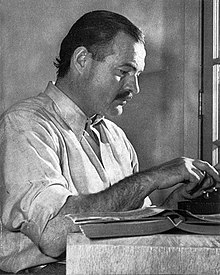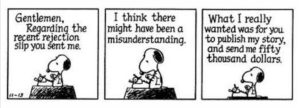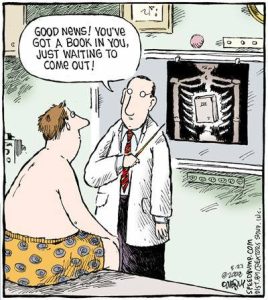I have been writing, in one form or another, for most of my life. I learned the techniques and skills of writing by toiling for almost 30 years in the relentless and stressful world of journalism.
I was in some pretty good company. Ernest Hemingway began his writing career as a journalist. So did Rudyard Kipling, George Orwell, Graham Greene, Charles Dickens, Evelyn Waugh, Joan Didion, Norman Mailer, Hunter S. Thompson, Jack London, Annie Proulx, Stephen Crane, John Steinbeck, James Agee, Lillian Ross, and Mark Twain.
For 13 years I taught writing and reporting at the University of Illinois after leaving the world of professional journalism. During that time, I managed to condense my thoughts on writing into a structure suitable for the classroom.
So allow me to share my views on writing.
Writing is both an art and a craft. To be a good writer you must first master the tools of the craft. What are those? They are vocabulary, grammar, research, style, plot, pacing, and story.
Words are your basic tools. They are your implements in the same way hammers, saws, bubble levels, squares, screwdrivers, and tape measures are the tools a carpenter must possess.
Then comes grammar. Just as carpenters must learn to respect and skillfully master their tools, so too must writers learn to skillfully manipulate words and respect the language.
If you don’t respect the language, you will never succeed as a writer.
You must also give yourself time to learn the art and craft of writing. You don’t learn how to be a writer by sitting alone in a room and squeezing your brain for inspiration the way you wring water from a sponge.
One of the first steps to becoming a good writer is reading. Read, read, and read. As I used to tell my students, “If you want to write well, read well.”
Learn from the best; imitate (and I don’t mean plagiarize). Listen to the words! Words speak to us from the written page, IF we let them IF we allow our eyes to open our inner ears.
Gifted writing can’t be taught. It must be learned.
And we learn from doing it; from experience. That’s how we gain confidence.
Let me repeat that because it is SO VERY IMPORTANT. To be a good writer you need to be confident in your ability to use the tools of the craft: vocabulary, grammar, research, style, plot, pacing, and story.
A confident writer is typically a good writer. We gain confidence by being successful in our work–no matter what work we do. We also learn from failure. Why was a book rejected 40 times? Why isn’t it selling on Amazon or Goodreads or Barnes and Noble? There must be a reason. Find out what it is and learn from it. Then go back to work and make the book better.
Once you master the Craft of Writing…the fundamentals, the mechanics, the “donkey” work, then you are ready to move on to the Art of Writing.
I don’t know if those who do not write for a living understand just how difficult writing is. Many believe that writers work from inspiration and that the words simply leap onto the blank page (or into yawning maul of the computer).

Ernest Hemingway once said: “There is nothing to writing. All you do is sit down at a typewriter and bleed.”
In fact, while inspiration is a wonderful thing, it is not what makes a good writer or book. Writing requires significant research, whether fiction or non-fiction. It requires a facility for organization and a keen sense of plot, pacing and story.
I don’t believe writers are “born.”
They evolve over time as a result of significant experience in the craft.
Not all writers are brooding, intractable alcoholics, or unbearable misanthropes who feel their creations contain irrevocable and definitive truths that most of humanity is too obtuse to comprehend.
In fact, most successful writers are excellent storytellers and they like nothing more than to have their stories read by as many people as possible–even if those stories don’t always possess immutable truths.
And storytelling is not limited to fiction. Storytelling in non-fiction or journalism is just as important.
When I was young, I used to write lots of short stories. Were they any good? No. But for a person who wants to be a writer they were my way of practicing. Sort of like practicing the piano or the flute or some other instrument. The more you practice, the better and more accomplished you become.
Somerset Maugham, the author of such classics as The Razor’s Edge, The Moon and Sixpence, and Of Human Bondage, had this to say about writing: “If you can tell stories, create characters, devise incidents, and have sincerity and passion, it doesn’t matter a damn how you write.”




Another wonderful column. Re the lede Snoopy cartoon—IMHO, Edward Bulwer-Lytton has received unfair criticism for the first seven words of his 1830 novel, “Paul Clifford.” If he’d merely deleted those opening words, the rest of the sentence stands up quite well as evocative description that shows rather than tells. The quote comparing writing to bleeding is usually credited to Hemingway; however, that attribution is surely spurious. According to Walter Winchell, Red Smith was the author of the phrase. For a good article on the provenance of writing/bleeding phrases, you might be interested in: https://quoteinvestigator.com/2011/09/14/writing-bleed/
Thanks, I will check out that quoteinvestigator link. I suspect it is a useful tool to have in the box.
Ron. Thanks (again) for the advice. It’s still great, even as an encore. Ben Franklin wrote, “Either write something worth reading or do something worth writing.” You have done both. I’m eager for your next book.